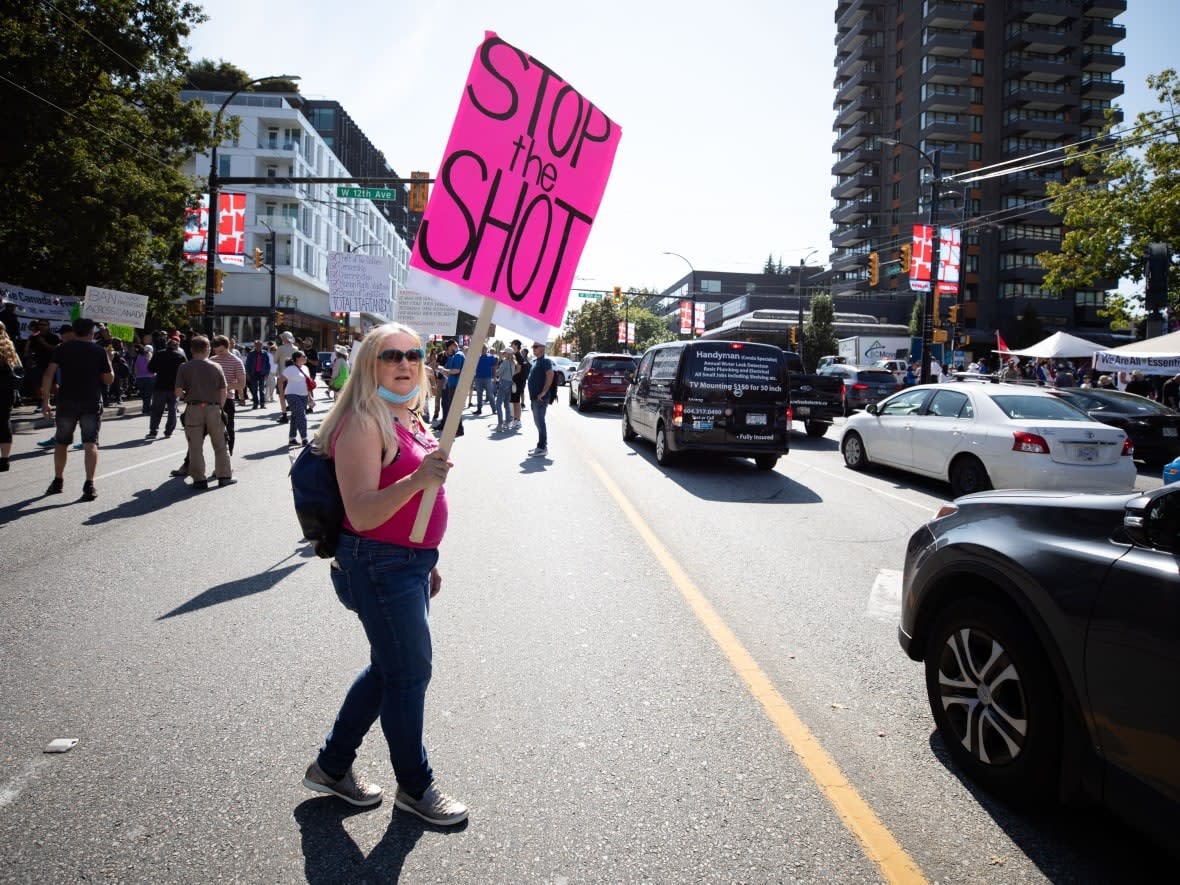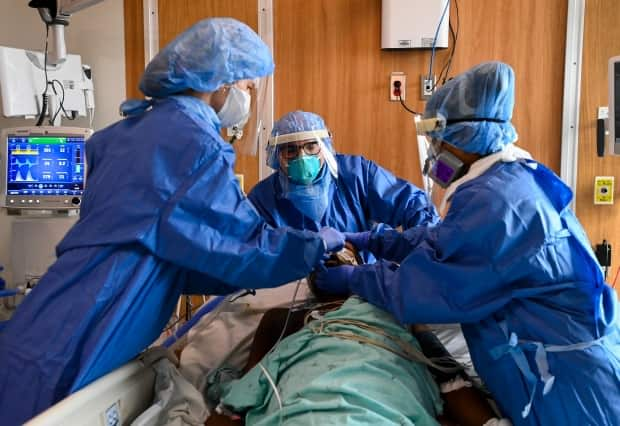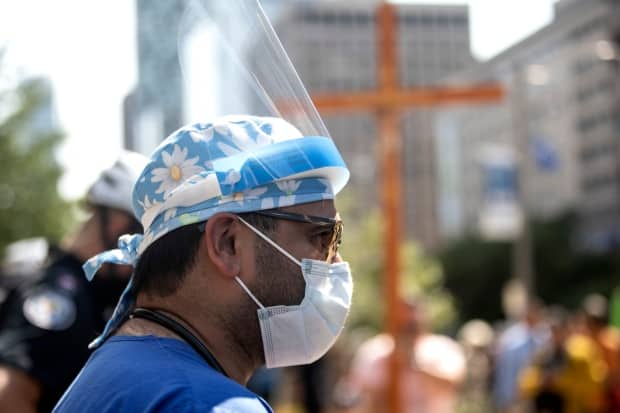Public outrage over the unvaccinated is driving a crisis in bioethics

The pandemic has triggered a new debate over what used to be a settled principle of bioethics — that you don't treat patients differently based on past behaviour that may have contributed to their condition.
"The core fundamental principle of clinical ethics tells us that once a person enters the hospital as a patient, whatever got them there is no longer part of the equation," said Vardit Ravitsky, who teaches bioethics at the Université de Montreal and Harvard Medical School.
"The most extreme example I have ever seen was when I lived in Israel and a suicide bomber detonated on a bus, killing and injuring civilians around him. Somehow he was not killed by the explosion and he arrived at the hospital with his victims.
"Once they entered the hospital, everyone was treated equally. There was no sense of prioritizing the victims in relation to the person who caused the injury."
But the COVID-19 pandemic — which has overturned so many norms and assumptions — is now testing that principle.
All of a sudden we find ourselves in a situation where the common good should sometimes be prioritized, and that has caused some unprecedented disagreements within the bioethics community - Vardit Ravitsky, Universite de Montreal
Vaccinated majorities in wealthy western countries are growing increasingly impatient with a science-denying minority being blamed for prolonging the pandemic and stretching critical care resources to the breaking point.
Governments are responding to that anger by turning up the heat on the unvaccinated with policies intended to inconvenience them, curtail their social lives, drive them out of the public square, make them pay or even criminalize them — measures Ravitsky said are "politically meant to appease the vaccinated majority."
Quebec plans to impose a financial penalty on unvaccinated people who don't have medical exemptions.
As president of the International Association of Bioethics, Ravitsky has seen how the pandemic has tested a longstanding consensus of bioethics.
"Usually, bioethics is all about protecting and promoting the right of each patient to make their own decisions," she said. "And all of a sudden we find ourselves in a situation where the common good should sometimes be prioritized, and that has caused some unprecedented disagreements within the bioethics community."
Life and death decisions
When demand for critical care surges beyond what hospitals can provide, triage is the process through which doctors decide who gets care first — a process that sometimes amounts to deciding who lives and who dies.
Canada has a patchwork of triage policies but most follow a fairly standard checklist of priorities designed to maximize benefits and minimize loss of life. Doctors first decide which patients have the best chances of pulling through. If they have to choose between two patients needing treatment and facing roughly equal odds of survival, they'll usually give priority to the patient they judge to have the most years of life ahead of them.
"Where I see some disagreement within the community of bioethicists is precisely on this point — can we use vaccination status as one criterion within triage protocols?" said Ravitsky.
"If we have two patients with the same level of clinical need, same age, same context, but one is vaccinated and one isn't, could we de-prioritize the patient who is unvaccinated by choice? There is a minority of bioethicists who are becoming more accepting of this logic at this point in time."

Ravitsky said she personally opposes using vaccination status to make judgments on triage.
Joe Vipond, an emergency room physician in Calgary, said there's no justification for blaming patients in the ER.
"A huge number of people are there because of poor decisions, because of substance abuse, because of other people's violence. We decided as a profession to treat everyone equally," he said.
"So it doesn't matter if you're a smoker and have emphysema. We'll see you and take care of you. It doesn't matter if you're intoxicated. We will see you and we won't judge you. I will offer you help and try to get you through that.
"So I have a hard time deciding that shouldn't apply to the poor decision of not getting vaccinated."
Dying on the waiting list
Research by the think tank Second Street shows that nearly 12,000 Canadians died while on various medical waiting lists during the period 2020-21. In Ontario, nearly four times as many people died while waiting for CT or MRI scans in 2020-21 than did five years earlier.
Not all of those deaths can be blamed on the demands placed on the system by the unvaccinated — but some probably can.
Dr. Vipond acknowledges it's a hard pill to swallow when people who claim to distrust the medical establishment, and refuse to get vaccinated against COVID, show up demanding medical treatment.
"The reality is we're all human. So we have those thoughts that go through the back of our mind and it really takes a conscious effort to put those aside and just provide the best care," he said.
"These people have made this decision based on poor social media algorithms. It could be easily argued that they have been manipulated down this path, that there's not as much free will as we would like to think we have.
"In a world with no perfect answers, my imperfect answer is we should be caring for everybody."
Living with choices made
Udo Schuklenk, Ontario Research Chair in bioethics at Queens University and co-editor of the journal Bioethics, questions the argument that vaccine refusers are victims of misinformation.
"There's many people in my field who go on about equity considerations, and [how] these people don't know better and they have been misled," he said. "And my view is, they have made their autonomous choice.
"And if you're telling me that they are unable to make a sensible choice, then we should take this choice away from them. But we should not, on the one hand, give them this choice, and then not hold them accountable for it.
"The vast majority of people in my field of bioethics would disagree with me on what I just said. They'd say there's many people who don't know better and have been misled. And my point is, that may well be true, but then this should have a consequence on the kind of choices that these people are permitted to make."

But Schuklenk said doctors don't want to be put in the position of having to withhold treatment to punish people for bad decisions.
"I am friends with a number of people who are cancer surgeons," he said. "And they feel anger that their patients are suffering the consequences of irresponsible behaviour by other people who refuse to get vaccinated and then block hospital beds. None of them are suggesting that for that reason we should discriminate against people who aren't vaccinated.
"They think they're stupid, they're angry at them, and all of that, but at the end of the day when they enter the hospital, they're treated like anybody else and no one looks back and says, 'How did they get here?'"
'Social justice' triage
Schuklenk said he also believes in the principle that "you don't look back at what made the patient become a patient."
But the pandemic is challenging the traditional notion of triage — even the idea that the goal of triage should be to save the most lives or life-years. Many North American triage protocols already have been rewritten to include non-medical criteria such as "equity."
"In some places it's certainly the case that equity considerations feature," said Schuklenk. "So, for example, if you come from a postal code where we know that there is low life expectancy for people due to their socioeconomic status, we need to compensate for that because it is not their fault."
The pandemic also has seen the rise of new "social justice" or "Give Back" triage protocols that reject the save-the-most-lives approach in favour of giving preference on racial or ethnic grounds. These proposals have gone mainstream and can be found in some of the world's most prestigious medical journals.
"It's not a view that I would hold," said Schuklenk, "but I'm a minority."
The public vs. the experts
Schuklenk said that, given the proliferation of triage criteria, he can understand why some feel "you might count vaccination status as a tiebreaker. Why not?"
He noted that recent opinion research suggests the public is on board with the idea.
"We know what doctors would say ... they would say the same thing that I would tell you," he said. "However, when you talk to the people that actually finance these health care systems — the citizens, the people — overwhelmingly, they tell you that you should discriminate against people that are unvaccinated.
"That raises really interesting questions about democracy. It may be that the doctors are the gatekeepers, but the truth is that we pay the bills. So if the vast majority of people in the country think that should happen, should that have an impact?
"I don't think it should happen, but it's worth thinking about anyhow."
Actions and consequences
Dr. Vipond said he'd be more open to pushing unvaccinated patients lower down the triage queue if they gave informed consent after refusing vaccination and before getting sick — by signing a waiver, for example.
"We do it for organ donor cards in those provinces that have an opt-in clause for organ donation," he said. "And these are strange times, so maybe we need to be creative.
"I'd be much more comfortable with that, because that means they've thought through the consequences of their actions. So that, I would say, would be a reasonable compromise."
Another compromise floated by some bioethicists is the idea of proportional allocation of resources between the vaccinated and the unvaccinated.
"Say there's 10 per cent of Canadians who are unvaccinated," said Schuklenk, "and they have no excuses, like a medical exemption. These colleagues have proposed saying, 'OK, there's ten per cent of Canadians who are unvaccinated, so we should make ten per cent of COVID beds available to them but no more.'
"I think it's at least worth thinking about."
In Canada — where the unvaccinated currently make up less than 10 per cent of the over-12 population but over the course of the pandemic constitute a disproportionately high portion of COVID-19 hospitalizations — such a division could deny treatment to the great majority of unvaccinated COVID sufferers during periods of peak demand.
But other patients — the ones now being denied treatment to accommodate the unvaccinated — might have a better chance at survival.
As with all triage decisions, the consequences would be measured in lives lost.

Most physicians and bioethicists remain wary of efforts to punish the unvaccinated, including proposals like Quebec's health surcharge.
Schuklenk pointed out that even if that surcharge is presented as a tax or user fee, rather than a fine, non-payment could quickly escalate to a criminal matter.
"In a liberal democracy," he said, "you always aim for the approach that infringes least on individual liberties."
Ravitsky agreed. She said political efforts to make life harder for the unvaccinated — to "screw up" their lives, in the words of French President Emmanuel Macron — don't serve the cause of public health.
"The point of public health measures is not to be punitive. It's not to make anybody's life difficult for the sake of sending a message.
"It's all about controlling the numbers."

 Yahoo Movies
Yahoo Movies 
